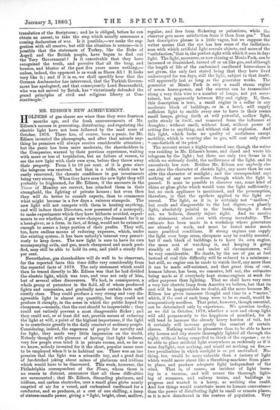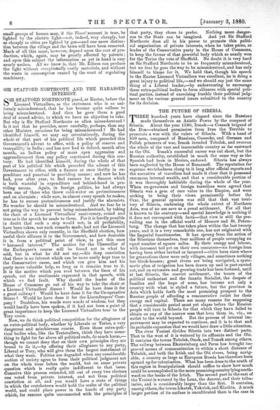MR. EDISON'S NEW ACHIEVEMENT. H OLDERS of gas shares are wiser
than they were fourteen months ago, and the fresh announcements of Mr. Edison's success in generating, distributing, and regulating the electric light have not been followed by the mad scare of October, 1878. There has, of course, been a panic, for Mr. Edison invented the phonograph, and after that miracle any- thing he promises will always receive considerable attention ; but the panic has been more moderate, the shareholders in the Companies, warned by their previous experience, waiting with more or less of trepidation, but no failure of reason, to see the new light with their own eyes, before they throw away their property. From 5 to 10 per cent. of it is gone since the telegram was received, but that is a trifle, which can be easily recovered, the chronic confidence in gas investments being very strong. When they have seen the new light they will probably be frightened, for Mr. Edison, if the accounts in the Times of Monday are correct, has attacked them in their stronghold, the lighting of private houses • but even then they will do better to consult experts, than to commence what might become in a few days a ruinous stampede. The new light will not compete with them in heating anything, and will induce their Directors, now possessed of a monopoly, to make experiments which they have hitherto avoided, experi- ments to see whether, if gas were cheaper, the demand for it as a heat-giver, as a form, in fact, of firing, would not be extensive enough to assure a large portion of their profits. They will, too, have endless means of reducing expenses, which, under the existing system, it has been nobody's interest very penuri- ously to keep down. The new light is sure to have its own accompanying evils, and gas, much cheapened and much puri- fied, may still be able to hold its own, and yield a steady five per cent.
Nevertheless, gas shareholders will do well to be observant, for the reported facts this time differ very considerably from the reported facts of 1878. The only statement which could then be traced directly to Mr. Edison was that he had divided the electric light, which was true, and true not only of him, but of several other discoverers. We had, in consequence, a whole group of patentees in the field, all of whom produced lights and companies, and gradually made certain facts suffi- ciently clear. They could produce a very strong and very dis- agreeable light in almost any quantity, but they could not produce it cheaply, in the sense in which the public hoped for cheapness,—namely, that the cost should be inapreciable ; they could not entirely prevent a most disagreeable flicker ; and they could not, or at least did not, provide means of reducing the light at will, a point of the highest importance, if the light is to contribute greatly to the daily comfort of ordinary people. Considering, indeed, the eagerness of people for novelty and for light, they made very little impression on the world. Nobody thought with pleasure of having that light indoors, very few people even tried it in private rooms, and, so far as we know, nobody invented for it the short, popular name sure to be employed when it is in habitual use. There was an im- pression that the light was a scientific toy, and a good deal of far-fetched joking about mines of platinum and iridium which would have to be discovered. This week, however, the Philadelphia correspondent of the Times, whom there is no reason to distrust, announces that all these difficulties are surmounted ; that Mr. Edison, discarding platinum, and iridium, and carbon electrodes, uses a small glass globe nearly emptied of air for a vessel, and carbonised cardboard for a conductor, and so produces, at a cost of one shilling, a lamp of sixteen-candle power, giving a "light, bright, clear, mellow, regular, and free from flickering or pulsations, while the observer gets more satisfaction from it than from gas." That last descriptive phrase is a little vague, but we suppose the writer means that the eye has less sense of the indistinct- ness with which artificial light reveals objects, and more of the " satisfaction," that is, the perfect sight with which it sees in day- light. The light, moreover, as now shining at Menlo Park, can be increased or diminished, turned off or on like gas, and although the length of life of the carbonised cardboard horse-shoes is not given, the only fact stated being that they have lived undestroyed for ten days, still the light, subject to that doubt, will apparently last as long as the generator works. The generator at Menlo Park is only a small steam engine of seven horse-power, and the current can be transmitted along a very thin wire to a number of lamps, not yet ascer- tained, but apparently between fifty and eighty. If, then, this description is true, a small engine in a cellar in any moderate block of buildings, or in a hotel, will supply sufficient light to enable every one to have in their rooms small lamps, giving forth at will powerful, mellow light, quite steady in itself, and removed from the influence of draughts ; without smell, without heat, without power of setting fire to anything, and without risk of explosion. And this light, which lacks no quality of usefulness except mobility, which is wanting also to gas, will cost only about "one-fortieth of its price."
The account seems a highly-coloured one, though the writer was residing in Mr. Edison's house, and dined and wrote his telegram by the light ; but there are only two items in it which we seriously doubt, the mellowness of the light, and its excessively low cost. Neither Mr. Edison nor anybody else can alter the character of electric light, any more than he can alter the character of sunlight ; and the correspondent says nothing of any new medium through which the light is passed. It must be possible to discover one, some kind of china or glass globe which would tone the light sufficiently ; but no such appliance is mentioned, and the presumption, therefore, is that the epithets applied to the light are unreal. The light, as it is, is certainly not "mellow," but crude and disagreeable to the last degree,—a ghastly light, absolutely painful to the brain, though it does not, we believe, directly injure sight. And we receive the statement about cost with strong incredulity. The estimate has been made in a workshop where generators are already at work, and must be tested under much more practical conditions. If strong engines can supply the light over large areas, cheapness may be readily secured ; but if each block of buildings is to have its own engine, the mere cost of watching it, and keeping it going steadily at all times and under all circumstances, will be very considerable. No doubt, by the use of gas as fuel instead of coal this difficulty will be reduced to a minimum ; but still, no engine can be made to watch itself, any more than it can be made self-existent, and that great item of cost, human labour, has been, we conceive, left out, the estimates being made as if everybody kept steam-engines at work for other purposes than lighting. That we shall have very soon a very fair electric lamp from America we believe, but that its cost will be inappreciable we doubt, all the more because Mr. Edison has given immense thought and time to a "meter," which, if the cost of each lamp were to be so small, would be comparatively needless. That point, however, though essential, can be determined only by experience. We question to-day, as we did in October, 1878, whether a new and cheap light will add permanently to the happiness of mankind, for it will tend to increase the already heavy burden of toil, but it certainly will increase greatly the comfort of certain classes. Nothing would be pleasanter than to be able to have city houses and city streets thoroughly lighted all through the night, withuut being compelled to think of the expense ; or to be able to place artificial light everywhere as recklessly as if it were daylight, cost nothing, and would set nothing on fire,— two peculiarities in which sunlight is as yet unrivalled. No- thing, too, would be more valuable than a factory of light which would move about like a thrashing-machine from place to place, and produce adequate light independent of the wind. That is, of course, an incident of light burn- ing in a vacuum, and will secure the thorough light- ing of steamers, and railway trains, and buildings in progress and wanted in a hurry, as nothing else could. And few things would contribute more to human convenience than the power of distributing light iu small or remote places, as it is now distributed in the centres of population. Very small groups of houses may, if the Times' account is true, be lighted by the electric light—not, indeed, very cheaply, but as cheaply as cities are lighted by gas—and one more distinc- tion between the village and the town will have been removed. Much of all this must, however, depend upon the cost of pro- duction, which, again, may be greatly affected by patents ; and upon this subject tie information as yet in hand is very nearly useless. All we know is, that Mr. Edison can produce the light -without exceptiobally costly materials, and without the waste in consumption caused by the want of regulating machinery.











































 Previous page
Previous page